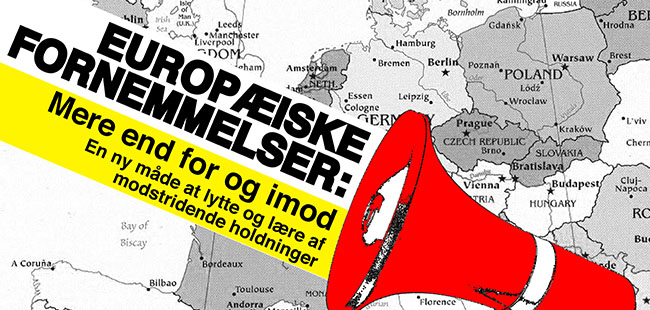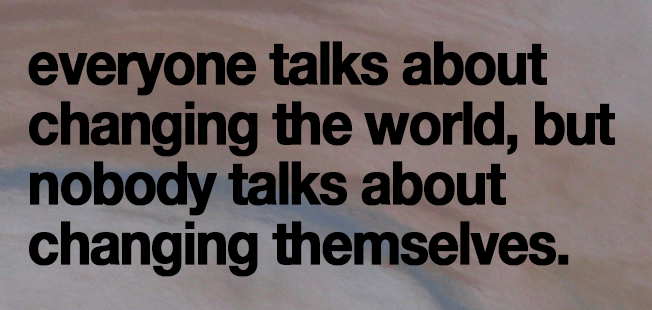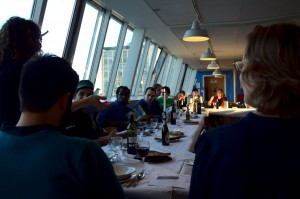There is definitely a magic in the air at the Muslim Jewish Conference. Individuals from different religions and cultures, who have heard so much about the ‘other’, get a chance to find out the individuality in each other, through the traditions and cultures given by their group. This is an amazing idea. Take people who, in some parts of the world, have learnt that they are enemies, and give them a chance to get to know one another. The very basic formula of getting to know the other to be free of prejudices works its magic throughout the week.
In one way, you really don’t need any more than this. Everything else is an excuse to fill up the time so that this learning of each other can take place. The scheduled sessions give the mind a framework that people are used to (from school, academia, etc.), but the beauty and the ‘real work’ take place in conversations and exchanges.
However.
The people choosing to come to this conference have applied and gotten accepted. This means that they are already open to these kinds of exchanges, that they have already passed that ‘first step’ and on some level acknowledge the need for such an exchange in our complex and divisive world. Therefore, there are those who, in addition to this exchange, would value an even deeper look into the issues embedded into our complex world, and which cause such an exchange to be so necessary and important right now.
The structure of the MJC relies on our existing hierarchal structures. Top down leadership makes decisions for the masses at the bottom. In this case, the decisions are based on shared values of peace, understanding, collaboration, solidarity, so the dominant bulldozing leadership style is largely forgiven, in fact even applauded and appreciated. After all, it is this bulldozing that fought so hard for the space to be created so that this exchange can take place.
But I’d like to offer the depth that I felt somewhat missing in the MJC by looking exactly at this dilemma, which is not unique to this conference but to the general approach of ‘changemaking’ in the NGO world. If there is a leadership, there are followers. The more successful such a conference gets, without a dose of self-reflection, the more this divide grows. Eventually, the same model that we are so trying to get away from is replicated – one group that knows what’s best for another. One group that considers themselves the ‘good’ ones, that need to ‘fight’ the ‘bad ones’ out in the world. This is not so far from any fundamentalist mentality.
Don’t misunderstand me – coming together and working together towards a peaceful world IS an evolution. Following a leader who advocates non-violence will ensure more safety than following a leader who uses division for power and conquest. But these two groups are existing in the same world, and we cannot ‘fix’ the world by subscribing to the “better” group. This feels good, eases our sense of morality, and allows us to escape from the frustration and destruction of the current model. But what if creates just as much division? What if the comfort in belonging to this new group prevents us from digging deeper into ourselves? What if following a leader, no matter what they stand for, is preventing us from discovering our own freedom? It’s much easier to have answers than questions.
When MJC is presented as an answer, a solution, we stop thinking. I’m writing this article because I’m a huge supporter of the MJC, not as an answer, but as part of a process.
I’ve heard a few times during the week some version of the statement that ‘every human being needs to belong’ to a group. I’d like to ask – why? Why is it that we need to belong? This would be a great question to explore on the first day. Every person has their own reflection on that question. You can explore the answer by thinking about the situation where you didn’t belong, and facing the feelings that come up. Is belonging a running away from these feelings? And if so, what is it that we are trying to avoid?
From what I see, this kind of self-reflection has been largely left out of our education system. Every person, if they choose, delves into this practice on their own – either through a religion, a spiritual practice, a psychological exploration, or in relationships. Looking at yourself from the inside is considered something we do on our own. This is again a division – the ‘me’ for myself and the ‘me’ for the world, the ‘me’ that IS and the ‘me’ that does, my work life and social life, the ‘me’ around my family and the ‘me’ around my friends. Division is conflict. It might not always be experienced that way (the term ‘conflict’ has a combative connotation), but if you look at internal conflicts, there is a part of me that wants this, and a part of me that wants that – the ‘me’ is split.
So why is this important? This self-exploration helps us understand ourselves. If we don’t understand ourselves, how can we understand the other? At MJC understanding the other is one of the core goals. On one level, this is done through discussing religious narratives, personal stories, and sharing traditions. This works, on this level, and will continue to work if MJC continues in the same way. But after a while, this will not be enough. This euphoric experience will blend itself very easily into self-righteousness, and the “we are the good ones” phenomenon will make us less connected, not more.
The MJC team works incredibly hard, and you can almost sense the despair in their ambition. How else can we live with ourselves if we don’t do this work? How can we not push as hard as we can for what we believe is right and good? And if the choices are despair and euphoria, who wouldn’t choose the blue pill?
I had to write this for fear of turning one Matrix into another. There is indeed a magic at the MJC, but without more in-depth conversations and explorations, this magic can be a topical potion just to numb the pain for a while. The pain, however, is still there. And we eventually are going to have to take a good, hard look at it.



